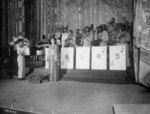Josephine Baker
| Surname | Baker |
| Given Name | Josephine |
| Born | 3 Jun 1906 |
| Died | 12 Apr 1975 |
| Country | United States, France |
| Category | Resistance |
| Gender | Female |
Contributor: Alan Chanter
ww2dbaseBorn in St. Louis, Missouri, United States in 1906, Josephine Baker (born Freda Josephine McDonald) grew up poor and witnessed many incidents of racial violence against fellow African Americans. In 1921, she married William Howard Baker and took on his name; they would divorce in 1925. At the age of 19, she was a vaudeville dancer in the Harlem neighborhood of New York, New York, United States when a French talent agent spotted her and brought her to Paris, France, where she raised exotic dancing to an art form, performed in films, and was embraced as a celebrity in a way that few African Americans were in a racially divided United States until several decades later. In 1937, she became a French citizen (naturalised as Joséphine Baker). Two years later, as war loomed, she was approached by Captain Jacques Abtey, an intelligence officer for the Deuxième Bureau, the French military intelligence and counter-espionage service, who asked her to exploit her access to social circles, which included officers and diplomats from various countries, by spying on those who might be Axis agents or French traitors. The assignment would be dangerous for her if the Germans invaded, but she accepted it readily 'The Parisians gave me their hearts, and I am ready, Capitaine, to give them my life' she told Abtey.
ww2dbaseBaker and Abtey grew close, and he did not ask her to risk her life by remaining as an agent in Paris when German troops entered the city in June 1940. Nazi racial policies would have ended her career there, in any case, and she fled to the Vichy zone in southern France, where she continued to perform in public occasionally while working secretly with Abtey for Charles de Gaulle's Free French movement. In early 1941, they departed for French North Africa by way of Spain.
ww2dbaseJacques Abtey travelled under an assumed name, posing as Josephine's press agent, and she smuggled documents across the border to Free French agents in Lisbon, Portugal including photographs hidden under her clothing and messages written in secret ink on sheet music. She continued to serve now and then as a courier for the French resistance in North Africa until American forces landed there in late 1942 and then entertained Allied troops until her beloved Paris was liberated in 1944.
ww2dbaseAfter the war Josephine resumed her career in show business, performing to enthusiastic sell-out audiences and receiving rave reviews. After many years of performing in Paris, Baker returned to the United States. In 1952 her outspoken condemnation of America's racial segregation laws led to an accusation of communist sympathies which resulted in the termination of her work visa. Cancelling her engagements in the United States she returned to France. While based in France, Baker continued to support the Civil Rights Movement during the 1950s. It would be a decade before she was allowed the return to the United States. For her wartime service to France, Josephine Baker was admitted to the Legion of Honour in 1961 and awarded the Croix de Guerre.
ww2dbaseIn 1963, she was one of the few women to speak at the March on Washington alongside Martin Luther King, Jr. In January 1966, Fidel Castro invited Baker to perform In Havana, Cuba, at the seventh-anniversary celebrations of his revolution.
ww2dbaseBaker continued to fight racial injustices into the 1970s. In 1973 she performed at Carnegie Hall in New York to a standing ovation. The following year, she appeared in a Royal Variety Performance at the London Palladium in London, England, United Kingdom, and then at the Red Cross of Monaco (French: Croix-Rouge monégasque) gala, celebrating her 50 years in French show business. In 1975 she performed for the last time. The show was sold out and she received a standing ovation. Baker passed away in Paris on 12 April 1975. On 30 Nov 2021 Josephine Baker would become the first black woman to be inducted into the Panthéon in Paris. She is buried at the Monaco Cemetery in La Colle, Monaco. A small amount of soil were taken from her birthplace in Missouri, from France, and from La Colle for a symbolic internment at the Panthéon.
ww2dbaseSources:
Neil Kagan & Stephen G. Hyslop: "WORLD WAR II - The Spies and Secret Missions That Won the War" (National Geographic, 2017)
Wikipedia - Josephine Baker
Last Major Revision: Mar 2023
Josephine Baker Interactive Map
Photographs
 |  |
Josephine Baker Timeline
| 3 Jun 1906 | Freda McDonald was born in St. Louis, Missouri, United States. |
| 12 Apr 1975 | Josephine Baker passed away in Paris, France. |
| 30 Nov 2021 | Josephine Baker became the first black woman to be inducted into the French Panthéon in Paris, France. |
Did you enjoy this article or find this article helpful? If so, please consider supporting us on Patreon. Even $1 per month will go a long way! Thank you. Share this article with your friends: Stay updated with WW2DB: |
- » Wreck of USS Edsall Found (14 Nov 2024)
- » Autumn 2024 Fundraiser (7 Nov 2024)
- » Nobel Peace Prize for the Atomic Bomb Survivors Organization (11 Oct 2024)
- » Wreck of USS Stewart/DD-224 Found (2 Oct 2024)
- » See all news
- » 1,150 biographies
- » 337 events
- » 43,917 timeline entries
- » 1,241 ships
- » 350 aircraft models
- » 207 vehicle models
- » 375 weapon models
- » 123 historical documents
- » 260 facilities
- » 470 book reviews
- » 28,560 photos
- » 432 maps
Thomas Dodd, late 1945
Please consider supporting us on Patreon. Even $1 a month will go a long way. Thank you!
Or, please support us by purchasing some WW2DB merchandise at TeeSpring, Thank you!